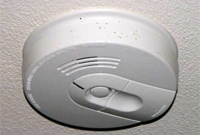Turn Your Clocks Back and Check Smoke Alarms, Carbon Monoxide Detectors
 Nov. 4 is when we turn back the clocks, the usual sad good-bye to another summer and fall. At Breakstone, White & Gluck, we suggest taking a few of the extra minutes you gained to replace the batteries in your home’s smoke alarms and carbon monoxide detectors. Check whether the devices are working properly and replace them if needed.
Nov. 4 is when we turn back the clocks, the usual sad good-bye to another summer and fall. At Breakstone, White & Gluck, we suggest taking a few of the extra minutes you gained to replace the batteries in your home’s smoke alarms and carbon monoxide detectors. Check whether the devices are working properly and replace them if needed.
Smoke Alarms
Massachusetts requires a smoke alarm be installed on every habitable level of a residence as well as on the basement floor. The law requires two types of smoke alarms: photoelectric and ionization. Only photoelectric smoke detectors are to be installed within 20 feet of kitchens and bathrooms with showers. Ionization alarms are more sensitive and more likely to be disabled in these areas. Outside the 20-foot zone, both photoelectric and ionization alarms are required.
Carbon Monoxide Detectors
Carbon monoxide is a colorless, odorless, tasteless gas which can emerge without any warning. In a home, it could be caused by a gas leak in a furnace or other appliance. Early symptoms may include headache and dizziness, though inhalation can quickly lead to serious injuries, seizures, comas and death.
In Massachusetts, residences are required to have working carbon monoxide alarms on every habitable level of the home or dwelling unit. You can purchase an individual carbon monoxide detector or a dual smoke alarm and carbon monoxide detector.
If you have questions, your local fire department is a good resource for information, along with the manufacturer of your devices.
The Boston personal injury lawyers at Breakstone, White & Gluck have over 85 years combined experience handling car accident, premises liability, wrongful death and other injury cases in Massachusetts. If you have been injured, it is important to learn your rights. For a free legal consultation, call us toll-free at 800-379-1244 or 617-723-7676 or use our contact form.

